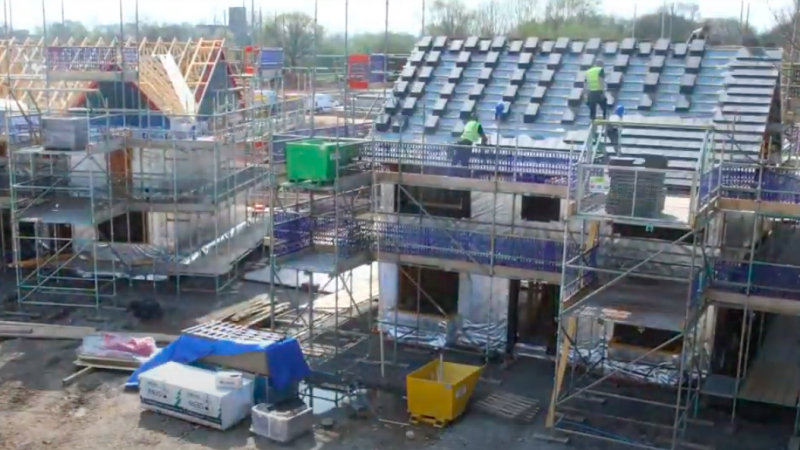The government is merely taking money from private capital pots for new construction and forcing the reallocation to remediation without appreciating what impact that will have on new supply.

Christopher Worrall is a housing columnist for LFF. He is on the Executive Committee of the Labour Housing Group, Co-Host of the Priced Out Podcast, and Chair of the Local Government and Housing Member Policy Group of the Fabian Society.
Recent building safety announcements have seen Michael Gove’s plans to make developers foot the bill come under the gun. In particular, as a number of developers continue to refuse to sign the developer remediation contract set out by his department, the deadline for which passed on Monday 13th March. Thirty-nine developers have signed the contract, which include some of the biggest housebuilders in the country. All are legally bound to fix unsafe buildings they developed or refurbished.
Gove argues this will come as a welcome relief for thousands of innocent leaseholders and tenants whose homes are covered by the contract. At the same time, those who have not agreed have been hit with a warning that they will be unable to operate freely in the housing market as a result. Post-Grenfell, many leaseholders have waited years for homes to be remediated following fire safety issues which were found to be widespread across the new build housing sector. Yet Lisa Nandy argues Gove’s contract only covers 1,100 buildings. Falling far short of what is necessary.
Nandy also used the announcements to continue calls to abolish leasehold in the Commons on Monday, while criticising the Conservatives for moving far too slow on the issue of remediation. Shadow Housing Minister Matthew Pennycook, took to Twitter following Monday’s building safety announcement questioning the alignment of the scope of the defects covered by the developers remediation contract, as well as the Building Safety Act. The latter being the safety requirements for landlords of buildings considered to be higher risk, which are at least 18m or 7 storeys high, with 2 or more residential homes. As a result, the scheme remains closed to mid-rise unsafe buildings.
Pennycook went on to ask when precisely such developers will be prohibited from development and building control approval, along with asking what will happen to those buildings that are affected by developers who refuse to sign. This comes after Gove had made the claim that companies who do not sign “will be out of the housebuilding business in England unless and until they change course”. He also went onto ask what action is being taken to address soaring building insurance premiums, as well as what protections non-qualifying leaseholders will be offered, claiming “leaseholders deserve answers”.
Meanwhile in Ireland, a state funded remediation scheme was launched earlier this year for €2.5bn to help homeowners who were affected by poor building quality during the Celtic Tiger boom era. Yet in England the government is clear it expects developers to bear the brunt of the costs. Even though we know from the Grenfell Inquiry that the complexity and blame for fire risk, across both the public and private sector, goes much further than just the developers. Now, legislation is crippling housebuilders, developers, and housing associations alike as remediation costs are pushed onto them.
What affect this will have on housebuilding output is quite obvious. Huge drops in surplus at housing associations who have been hit with costs under the Building Safety Act will see their development pipeline hit. In the context of a planning system in abeyance, the financial viability of such organisations will inevitably come into question. It is obvious those who are affected need to be helped as soon as possible. But is this dragged out game of cat-and-mouse to the benefit of the residents or the Tories, as they continue to try and point the finger of financial incompetence at Labour?
An uncertain property market, drops in new starts-on-site, and capital expenditure diverted to remediation will see our housing crisis exacerbated under these half baked ideas from Michael Gove. End Our Cladding Scandal may have welcomed the naming and shaming of those who have not signed the contract yet called on government for a redress scheme like that launched in Ireland for those who do not sign, followed by recovering the costs from non-signers at a later date.
In my mind, the government is merely taking money from private capital pots for new construction and forcing the reallocation to remediation without appreciating what impact that will have on new supply. Yes, remediation should be paid for by those who have failed. But as aforementioned, the buck ultimately has been handed to the developers, but not the contractors, the sub-contractors, nor the suppliers or government regulators who all played their part in causing such tragedy. A government backed redress scheme with improved building regulation is a much quicker, more straight forward way to go.
Left Foot Forward doesn't have the backing of big business or billionaires. We rely on the kind and generous support of ordinary people like you.
You can support hard-hitting journalism that holds the right to account, provides a forum for debate among progressives, and covers the stories the rest of the media ignore. Donate today.



